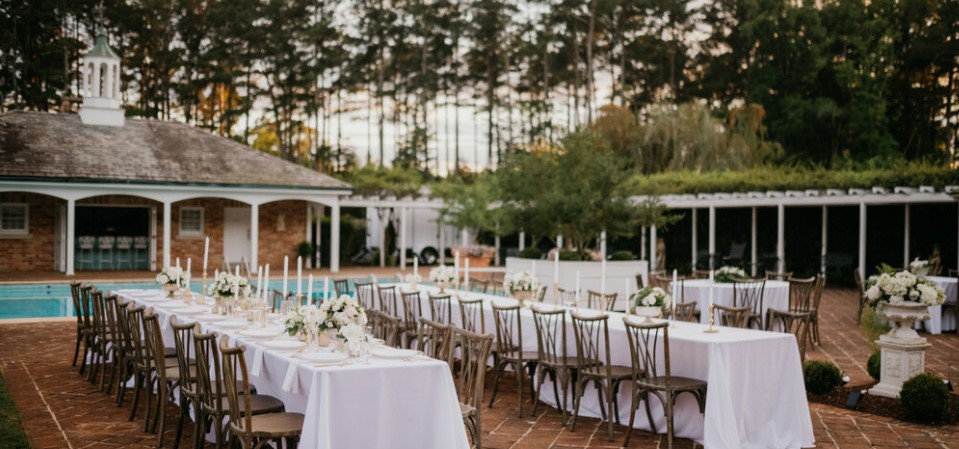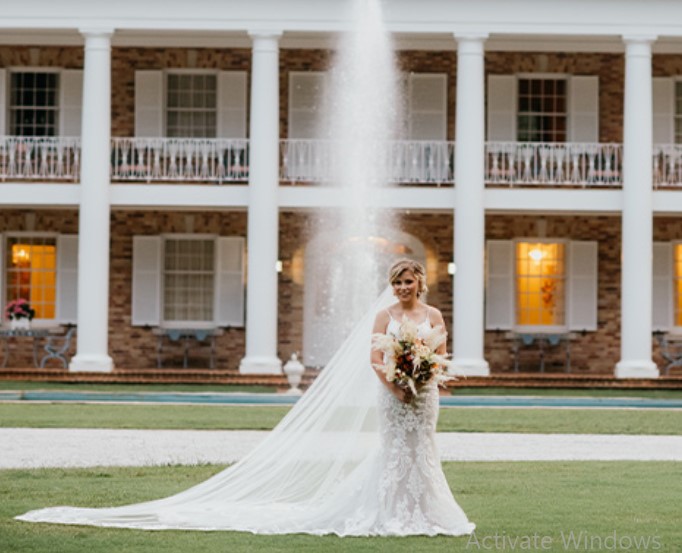Your Magic Moment Awaits
Your wedding day. Without a doubt, it's one of the most significant events you will ever experience - when you and the love of your life officially seal the deal and get married. On this day, your friends and family will gather to celebrate the next step in your life. Photographers will be running around snapping photos, catering plates delicious food for guests to enjoy, and the DJ sets the mood for a night of fun and libation. You've worked extra hard to make everything look perfect and run smoothly. You have examined every moving part down to the tiniest detail. At the center of all your effort is your wedding venue in Saint George, SC.
Your event space can mean the difference between an unforgettable event and an average occasion. Capturing your uniqueness as a couple is paramount to a memorable wedding. But, without the right venue location and staff, your unforgettable event can turn into a painfully average occasion. Fortunately, at Abney Hall, you won't ever have to worry about dingy reception spaces and crummy chow halls.
Constructed in Saint George, SC, in 1962, Abney Hall is 15,000 square feet and sits on 500 acres of land, making it a large wedding venue unlike any other. Abney Hall was originally the home of Mrs. Josephine Abney, a Saint George native who was a lifelong philanthropist. Mrs. Abney devoted much of her time and effort towards supporting charities, educational institutions, hospitals, and other noble efforts. Today, Abney Hall stands tall as a symbol of love, both in our community and for the couples who choose to get married here.
Abney Hall is an exclusive event experience unlike any other, surrounded by verdant forests and sparkling ponds. Our venue is a natural fit for several occasions, including:

Weddings

Bridal Showers

Bridal Portraits

Rehearsal Dinners

Corporate Events

Much More!

The Top Wedding Venue in Saint George, SC
The beginning of your life starts at Abney Hall. With our team by your side, we can create the fairy tale wedding you have dreamed about since childhood. Whether you have 100 guests or 1,000, our waterfront ceremony locations and French-inspired courtyard are perfect for your big day. Celebrate in luxurious style surrounded by shady magnolia trees, a private forest, large ponds, and the beauty of Mother Nature. While our venue location and aesthetic have been praised far and wide, so too have the practical aspects of Abney Hall. Looking for a relaxing, comfortable spot for your bridal party to get ready in? We offer an entire floor in the Abney Hall residence to get the bridal party ready. Want to make your groomsman feel extra-special too? We've got a private, plush house just feet from a sparkling pond that is a proper hangout spot for the guys in your group.
To make life easier on you, we also offer Abney Hall as your go-to spot for rehearsal dinners. Why book an expensive restaurant or travel to another location when unmatched beauty and convenience are right at your fingertips? Abney Hall is just the place for that very important dinner the night before your big day. We are also happy to host your bridal shower at Abney Hall. Our venue makes for one of Saint George's most unique bridal shower settings, where your family and friends can gather to give gifts and be merry before you walk down the aisle.
With such a large, magnificent house and a vast property, Abney Hall also makes for an unforgettable location for your bridal portraits and other wedding-related photography needs. Don't take our word for it - book a tour and see for yourself why so many new brides and grooms choose Abney Hall as their wedding venue in Saint George.

What Sets Abney Hall Apart from Other Wedding Venues in Saint George?
You've already found the person you want to spend the rest of your life beside. The next step? Finding the perfect wedding venue for your ceremony, reception, and celebration of your lifelong commitment to one another. Remember, the backdrop for photos, dancing, eating, and all other activities will be at your wedding venue. That's why we work so hard to set Abney Hall apart from our competitors - so you and your guests can focus on love and living your new life while we work with your vendors and photographers to make your magic night a reality.
Here are just a few reasons why guests choose Abney Hall as their wedding venue in Saint George, SC, along with some helpful tips from our experienced wedding venue staff:
Venue Size
Choosing the appropriate-sied venue for your desired guest count is a critical decision. A venue's capacity affects the number of people you need to consider having at your ceremony and reception. As you're first starting out, we recommend having a guest count in mind as you're searching for the right venue. Try to stick with that number. You may fall in love with a particular venue, but if its max capacity can't accommodate your guest count, it may be time to cross them off your list.


Abney Hall Pro Tip:
Keep in mind that this is your big day. You shouldn't feel obligated to invite the college roommate you shared a dorm with for one semester. At the end of the day, your wedding venue should be one that can accommodate those closest to you. Abney Hall is equipped for both small and large weddings, consisting of 500 acres of forest, ponds, and lush natural beauty. Whether you want an intimate wedding with only your best friends or a grand ceremony with hundreds of people, we have the right amount of room to make you comfortable.
Location and Nearby Lodging
On your big day, you're likely to have friends and family traveling in from other parts of the state or country. These folks will need a place to stay during and even after your wedding. Accessibility and ease are important factors when it comes to choosing your wedding venue for both you and your guests.
Located in Saint George, SC, Abney Hall is situated in a memorable, natural setting, giving your wedding a private vibe in the midst of Mother Nature. While we pride ourselves on having a secluded wedding event space, our venue is within an easy driving distance of hotels and vacation rentals.

Abney Hall Pro Tip:
When you contact us for a tour, make sure to speak with our experienced venue manager about nearby hotels and shuttle service options. We understand that your guest's comfort and convenience are important, and we're happy to work with you to figure out the best way to get your guests to Abney Hall.
Venue Staff
At Abney Hall, our staff has earned its reputation as one of the industry's most friendly, accessible teams. We will provide you with a purpose-minded point of contact that can help answer questions relating to timelines, preferred vendors, and every aspect of your wedding. When you tour our wedding venue in Saint George, SC, for the first time, we want you to feel like you have all the information you need to make an informed purchasing decision.
We would be happy to go over:
- Venue Pricing
- Ceremony Specifics
- Reception Specifics
- Catering Possibilities
- Decorating Possibilities
- Entertainment Options
- Photography and Photo Opportunities
- Venue Amenities
- Bridal Party Needs
- Groomsman Needs
At Abney Hall, our goal is to be your first resource when it comes to setting up and coordinating the details of your wedding day.
Decor
When it comes to your wedding's decor, you probably already have a few ideas in mind. We love it when our brides and grooms have a vision in mind because one of our greatest joys is turning that vision into a reality. At Abney Hall, our team is available to help you and your decorator fit, accent, and accommodate your fairy-tale wedding - whatever that may be.
Are you looking to dress up your wedding with decorations galore? Just want to add a few accents that tie into your preferred color palette? Abney Hall is versatile and ready to help however we are able.


Abney Hall Pro Tip:
If you're thinking about bringing in your own greenery, lighting, floral pieces, and more, we recommend discussing your vision with us on your initial tour of our event space. That way, we can get a head start on making your big day exactly how you envision it.
Photo Opportunities
10 years from now, when you and your spouse are celebrating your anniversary, you will pull out photographs from your wedding and will reminisce about the unforgettable time you spent at Abney Hall. Your wedding photos will be with you forever, and as such, we work closely with you and your photographer to suggest extra-special photo op spots that you can only find on Abney Hall grounds.
From the grand staircase and French-inspired courtyard to our manicured gardens and lovely pond, there is no shortage of photo-op locations for your photographer to choose from. As one of the most popular wedding venues in Saint George, SC, we have worked with dozens of photographers over the years.
Our experience has allowed us to cultivate a list of preferred photographers - all of whom have the talent to take your pictures to the next level in a setting they're familiar with. We encourage you to check out our gallery to get a sense of the scope of our wedding venue and gain inspiration from other happy couples.

Abney Hall Pro Tip
The gallery on our website is extensive but be sure to check out our Facebook and Instagram pages as well. We keep our social pages updated with recent wedding photographs, giving you an incredible resource that you can use for your own photography purposes.

The Premier Corporate Event Venue in Saint George, SC
Abney Hall is known across the United States for our stunning weddings, but we also play host to some of the largest corporate events in South Carolina. Why choose a bland, lifeless meeting space when you can enjoy the beauty of Mother Nature coupled with a professional atmosphere? If you have an important team-building event or corporate conference that you have to coordinate, look no further than Abney Hall.
The epitome of class and style, our corporate event space is large, lavish, and chock-full of onsite amenities for you and your co-workers to enjoy. If your team needs a morale boost, don't bring them to the local Olive Garden for a cheap lunch. Treat them to a refreshing experience in our main dining room, where we can work with you to incorporate your catering options with the goals of your event.
When the hard work is done, and your team needs a breather, what better way to relax than with a quick dip in our pool? To burn off a little steam, head over to our brand-new tennis court - the perfect place to get some exercise in an ultra-private setting while you enjoy the sights and sounds of nature. Don't forget to bring your fishing poles for a couple of hours of fishing. There's even an opportunity to go hunting if you wish.

Elegance at Its Finest - Only
a Phone Call Away
If you're ready to learn more about Abney Hall as your wedding venue, don't hesitate to reach out. We would love to hear more about your plans, your vision, and your needs. We know that planning a wedding isn't easy. It takes time, attention to detail, and a whole lot of patience. Our goal is to help provide you with all the info you need to learn more about our venue. Once you decide on a date, we'll work closely with you and your vendors to craft a wedding experience that you will treasure for the rest of your life.
Our available dates for your big day are going quick, especially during peak seasons like spring and fall. We look forward to hearing from you soon!
Contact us today for a FREE initial consultation
Latest News in Saint George, SC
Growing pains may hit St. George with proposed 'cluster' housing development
Jennifer Benthttps://www.postandcourier.com/news/st-george-cluster-housing-dr-horton-dorchester-county/article_6640248e-ba10-11ee-a72f-1ba7e2762225.html
ST. GEORGE — The tiny town in northwest Dorchester County might be getting some new next-door neighbors, and more, in one residential influx than it has ever seen before.If approved by the county, a "cluster" housing development proposed by the D.R. Horton, a national builder, would bring more than 330 new homes and a new zoning designation for roughly 300 rural acres near the "Town of Friendly People."While the development would land on Sugar Hill Road outside town limits, St. George would provide wat...
ST. GEORGE — The tiny town in northwest Dorchester County might be getting some new next-door neighbors, and more, in one residential influx than it has ever seen before.
If approved by the county, a "cluster" housing development proposed by the D.R. Horton, a national builder, would bring more than 330 new homes and a new zoning designation for roughly 300 rural acres near the "Town of Friendly People."
While the development would land on Sugar Hill Road outside town limits, St. George would provide water to the development while Dorchester County Water and Sewer would provide sewer services, said Kiera Reinertsen, the county's planning director. The development would also add an estimated 100 students to Dorchester School District Four and draw on services and amenities from St. George’s Fire Station Nine, Davis-Bailey Park and the town’s library.
“We’ve never had this many houses come in at one time since I’ve been here,” said Mayor Kevin Hart, who has lived in the town for 35 years.
The 2.8-square-mile town is home to roughly 1,800 residents, according to the U.S. Census Bureau. Now the county seat, St. George was originally called George’s Station as a stop along the South Carolina Railroad, now Norfolk Southern. It was incorporated in 1875.
“We haven’t had a housing development like this in this area before. There’s no way we can stop them, but we have to make plans. We won’t know it works until we see how it goes,” Hart said. "... Some want to keep our small-town feeling. It’s a tough battle, and we knew it was coming. You can see the progress coming all way up Highway 78. Harleyville is having the same challenge as St. George.
“We’ve got to hope and pray our best laid plans go well for our little town.”
Described as “America’s largest home builder” on its web site, with operations in 45 markets nationwide and 1 million homes constructed since its inception in 1978, D.R. Horton wants to change zoning for the property for the proposed development from agricultural residential, which allows one-acre home lots, to single family residential (R-1), which reduces lot sizes to a third of an acre.
300-acre rezone request in St. George goes before planning committee
Melissa Rademakerhttps://www.live5news.com/2024/01/23/300-acre-rezone-request-st-george-goes-before-planning-committee/
DORCHESTER COUNTY, S.C. (WCSC) - The Dorchester County Council is looking at a proposal to rezone 300 acres of land in St. George through using a new process.The rezone ask is to allow for clusters of homes and create a high-density neighborhood at the old St. George Country Club property. Monday, the topic appeared on the agenda only as an informational meeting within the planning committee.Committee Chair Dave Chinnis says the informational meeting a the committee level first is a somewhat new step in the process.&ldqu...
DORCHESTER COUNTY, S.C. (WCSC) - The Dorchester County Council is looking at a proposal to rezone 300 acres of land in St. George through using a new process.
The rezone ask is to allow for clusters of homes and create a high-density neighborhood at the old St. George Country Club property. Monday, the topic appeared on the agenda only as an informational meeting within the planning committee.
Committee Chair Dave Chinnis says the informational meeting a the committee level first is a somewhat new step in the process.
“One of the things that we seem to always do is give everything a first reading automatically. But we also had questions so then we get a second reading, and we ask questions, and we weren’t getting answers. To a third reading, which was ultimately when we were making the decision to pass or not to pass to zone or not rezone something,” Chinnis says.
Walking through that process, Chinnis says the lack of preparation didn’t make much sense to him. Talking with a Charleston County Council acquaintance, he decided to adopt one of their steps for large proposals - like the 300 acres in St. George. Thus, the informational meeting now happens before coming to council, to make future readings and public hearings even clearer on the details.
“I believe this St. George project is probably only the second maybe the third that we’ve had this,” Chinnis says.
Chinnis says this process will hopefully benefit everyone with an interest in a project. At the old St. George Country Club, the land is zoned agricultural, which allows for building houses on one-acre plots. The developer wants to change that to one-third acre plots but is promising to include green space. Chinnis says he’s already been able to nail down what that green space will be.
“I know in this case, we talked about open space being accessible, like community parks, pocket parks, so the people living in this neighborhood can go to their local park,” Chinnis says.
Chinnis says this is only the earliest stage of the major proposal, and there will be three full council readings, including a public hearing in the future. Now, he believes, those discussions will have more answers readily available when the public or council asks questions.
“The public gets input on everything. Sometimes there’s reasonable concerns. A property owner has certain rights, just like the person speaking has rights on their property. That property owner has rights on what they can and can’t do to their property and balancing that is always the challenge,” Chinnis says.
Chinnis says the public hearing for the 300-acre old St. George Country Club re-zone request will be at the St. George chambers, and the date will be posted 15 days ahead of time.
Copyright 2024 WCSC. All rights reserved.
$100 million industrial park set to be completed this quarter
Autumn Kleinhttps://www.live5news.com/2024/02/26/100-million-industrial-park-set-be-completed-this-quarter/
SAINT GEORGE, S.C. (WCSC) - A Dorchester County industrial park in the works for over 15 years is soon to be completed and will provide many more jobs and access to products for the area.Winding Woods is a 1,300-acre industrial park in Saint George and Port 95 is a private development within the park. Port 95 will serve as distribution and manufacturing centers for different companies.Crews are anticipating three buildings to be a ...
SAINT GEORGE, S.C. (WCSC) - A Dorchester County industrial park in the works for over 15 years is soon to be completed and will provide many more jobs and access to products for the area.
Winding Woods is a 1,300-acre industrial park in Saint George and Port 95 is a private development within the park. Port 95 will serve as distribution and manufacturing centers for different companies.
Crews are anticipating three buildings to be a part of Port 95, but they are currently completing construction on the first two. One of these buildings will be one million square feet, making it one of the largest buildings in the Charleston region.
This giant building can hold anywhere from one to four companies alone. The second building is about 240,000 square feet and will hold just one company.
This project in its entirety cost $100 million and was privately funded. They have yet to lease the spaces out, but Dorchester County Director of Economic Development John Truluck says they have many prospective companies. He said they have had an encouraging amount of people come to scope the buildings out, but nothing has been finalized yet.
Truluck says they are excited for this project to be completed.
“It has sort of been a field of dreams for Dorchester County to build it,” he says, “So it’s always interesting you know, when the first 10 years of this, everything has been below the surface, but now when you start to see something go vertical, it gets exciting, because that’s real and then everybody else in the community can now see it.”
They first broke ground on this project in October 2022 and are looking at anticipated completion at the end of the quarter. This project is a part of Dorchester County Council’s strategic plan to bring more employment and tax base to areas of the county that haven’t seen growth in the past. Truluck also anticipates that the project will bring more products to the county and believes that all of this will help congestion problems on I-26 from people commuting.
“Our whole objective is to bring jobs and investment to parts of Dorchester County that haven’t had that in the past. So, we hope to fill these buildings with, with jobs so that folks that live in Saint George can also work in Saint George,” Truluck says.
Truluck says that while the physical structure is almost complete, it likely would not be until 2025 that these buildings are up and running. He says the buildings are meant to act as shells so that the companies can make the space suitable for their needs. He said this process would probably take a few months after leasing.
Copyright 2024 WCSC. All rights reserved.
Google confirms it is behind Project Dawson data center campus in South Carolina
Dan Swinhoehttps://www.datacenterdynamics.com/en/news/google-confirms-it-is-behind-project-dawson-data-center-campus-in-south-carolina/
Google has confirmed it is behind a data center development project in Ridgeville, South CarolinaThe search and cloud company has also received permission to develop three more data centers in Belgium.Google confirmed to expand in South CarolinaGoogle has revealed itself to be behind the Project Dawson data center proposals in South Carolina.“The Dorchester County Economic Development (DCED) office, which serves to support economic growth in the county, confirms a relationship with G...
Google has confirmed it is behind a data center development project in Ridgeville, South Carolina
The search and cloud company has also received permission to develop three more data centers in Belgium.
Google confirmed to expand in South Carolina
Google has revealed itself to be behind the Project Dawson data center proposals in South Carolina.
“The Dorchester County Economic Development (DCED) office, which serves to support economic growth in the county, confirms a relationship with Google who recently closed on property in the county,” the DCED said this week.
“We are thrilled to welcome Google to Dorchester County and know they will be a long-term partner for our community, especially our schools,” said Dorchester County Council Chairman Todd Friddle. “Google has a history of strengthening local workforces and uplifting communities, and we look forward to Google making a positive difference here in Dorchester County.”
Campus specifications or project timelines haven't been shared.
According to the Post and Courier, the company aims to invest $510 million in the new campus – a 231-acre site along Research Center Drive and Highway 17A in Dorchester County’s Pine Hill Business Campus. The Dorchester County Council voted to change the site’s zoning earlier this month.
Google – previously reported as the company likely involved – has previously been conducting business around the project behind the Autumn Timber LLC and Mallard LLC company names. The search company had been referring to the site as Project Dawson.
“We have been proud to call South Carolina home for over fifteen years since we first put down roots in Berkeley County,” Google said in a statement. “Since then, we have partnered closely with local leadership, schools, and nonprofits to lift up the great work happening here. As we look to expand in the state, we have acquired property in Dorchester County for the development of a new data center campus. We look forward to growing our community here in South Carolina and will share details as this long-term project progresses.”
Google currently operates a South Carolina data center campus in Moncks Corner, around 20 miles east of Ridgeville. The company recently acquired another 140 acres in the area.
The Post and Courier also reports that Google, going by the aliases Project Evergreen and Gannett Enterprises LLC, has also is purchasing 206 acres for a proposed third data center near the county's Winding Woods Commerce Park along Pecan Tree Road and Highway 78, outside the town of St. George. The company was granted a $5.55 million purchase option for the land this month.
However, the company reportedly aims to focus on the Pine Hill campus for now, and will expand to the Winding Woods site as demand requires.
Google expands in Belgium
In Belgium, Google has been granted permission for a new data center campus.
The Walloon Region has issued an urban planning permit to the company for the construction of a new data center campus in the Hainaut municipality of Farciennes. The company is reportedly investing €600 million ($646m) in the project.
“The Walloon Region has just granted the permit for the installation of Google in Farcienne,” said Hugues Bayet, mayor of the municipality of Farciennes. “A new step in the realization of the digital giant's welcome in our region and above all the net creation of many jobs!”
Plans for the camps were first announced in July 2023. The campus will span some 53,000 sqm (570,500 sq ft). Previous reports suggested work would begin on the first phase – spanning around 7,500 sqm (80,730 sq ft) – would begin last year and launch in 2025.
More recent press suggests groundbreaking for the first 80MW phase is due to happen later this year.
Google acquired 53 hectares of land in the Ecopôle eco-business park, located across the municipalities of Farciennes, Aiseau-Presles, and Sambreville, in 2019. According to previous reports, energy firm Elia has confirmed that 200-300MW of capacity would be available on the site.
Belgium’s Saint Ghislain was the site of Google’s first data center in Europe. The company has built five data centers at its 90-hectare Saint-Ghislain site since 2009 as well as a solar plant. The company uses the shell company Crystal Computing for much of its dealings in Belgium.
2022 also saw Google acquire a 36-hectare site located in Ecaussinnes, in Hainaut province, in the Feluy industrial zone near La Louvière.
According to Raphael Stokis, a delegated official of the Walloon Region, the conditions attached to the permit will require on-site solar panels. Additionally, 90 percent of the energy consumed on the site must be carbon-free by 2025 and this must even be 95 percent by 2030.
Google will also have to opt for a more sustainable cooling system for the data centers in future – reportedly switching from systems that use water-consuming technology to air-cooling.
Historic Rosenwald School to inspire exploration, learning as Children's Museum expands
Megan Fernandeshttps://www.postandcourier.com/news/charleston-childrens-museum-of-the-lowcountry-st-george-rosenwald-school/article_6580448e-6470-11ee-8c2c-f32ee52ba6a2.html
ST. GEORGE — Four former classrooms in the historic Rosenwald School in St. George will once again become a place to teach young minds as the space becomes the Children’s Museum of the Lowcountry’s first — but not last — satellite location out...
ST. GEORGE — Four former classrooms in the historic Rosenwald School in St. George will once again become a place to teach young minds as the space becomes the Children’s Museum of the Lowcountry’s first — but not last — satellite location outside of Charleston.
The renovated St. George Rosenwald school is one of about 500 in the state and one of nearly 5,000 in the South, all constructed in the early 1900s. Those who have rallied behind preserving the school envision it becoming the community center of the town. It reopened to the public in August.
When it was built in 1925, it was a six-teacher school dedicated to educating African American children. Now, the north wing of the H-shaped building will take on a new life educating future generations as an extension of the Children's Museum of the Lowcountry.
A new museum
The approximately 2,500 square-foot space within the Rosenwald School will feature a tinker lab with hands-on exhibits to explore engineering concepts; a child-sized grocery store where children can learn about nutrition, commerce and money; a space that can promote visual and performing arts; and classroom space for educational programs or field trip groups. It is expected to open in spring 2024.
Karen Coltrane, CML’s president and CEO, called it a "natural extension of our efforts to serve the greater Lowcountry" outside of its downtown Charleston location.
Coltrane said it’s about teaching kids basic concepts that they can connect to real-world situations. For example, a child may see the apple tree and grocery area in the new exhibit, and the next time they are at the store with a parent, they can understand apples come from trees and that people buy apples at the store with money.
“Making those kinds of connections are vital in early development,” Coltrane said. “It’s easier to get them excited about science and learning when they’re little instead of trying to spark it later.”
The milestone marks the nation's first adaptive reuse of a Rosenwald School as a children's museum satellite. It's the starting point for the museum's plans to expand to more rural areas of the Lowcountry.
“It’s going to be a game-changer in expanding access to museum resources for school field trips,” Coltrane said. “By the time you load up a bunch of kids from these more rural areas and bring them downtown, they don’t have a lot of time to spend at the museum itself. This would give them more hands-on access closer to home.”
Connecting past with present
Ralph James, chairman of the board that operates the Rosenwald school, called the restored building the “jewel of the community.”
“It has always been the desire of the community and alumni of the school to see it restored,” James said. “The original effort of the school was built on the foundation of an opportunity to empower members of our community to be able to increase their educational pursuits. We look forward to offering cultural enrichment to the community once again and again charging students with the task to be all that they can be.”
Revitalizing the school has been more than a decade in the making.
Coltrane had taken a tour of the Rosenwald building in 2015 with then-state Rep. Patsy Knight. At the time it was shuttered, shrubs were overgrown and the weatherworn building was not in great shape, Coltrane recalled. She was leading EdVenture in Columbia, scouting for a potential secondary location. While it didn’t pan out, it ignited the idea for the historic building's potential to become a museum outpost.
Coltrane had moved on to other ventures before returning to the Palmetto State to lead the Children's Museum in downtown Charleston. During her second week on the job, Ralph James, board director of the Rosenwald School, called her asking if a children’s museum satellite post was still on the table. Her immediate answer was yes.
Today's Top Headlines
While grants and donations are funding the buildout of the project, Coltrane hopes to secure federal and state funding to operate it in the short term. Ultimately, the goal is to open another satellite location in Dorchester County that could help offset operating costs for the Rosenwald location.
The Children’s Museum downtown sees roughly 130,000 visitors per year. The museum is currently trying to raise $4 million to revamp the downtown location. While expanding the downtown location is out of the question, Coltrane hopes they can reconfigure and maximize the space with new and refreshed exhibits.
“Because we operate within the constrictions of a historic building, the only way to grow is to make the best of the space we have and add additional locations,” Coltrane said.
Investing in the future
The project was funded through investments totaling $300,000 made by Boeing Co. and other local philanthropists.
Erin Fisher, a senior manager for the 787 maker's community engagement efforts, said that efforts to develop a workforce pipeline can't just target high school and college-age students. She said it starts by pushing children to embrace problem-solving and science- and math-based concepts, with the hope that it will set them down a career path in advanced manufacturing or engineering, she said.
“Our work with the Children's Museum is a way to support education from cradle to career,” she said. “This is an opportunity to engage with students on the early childhood level to spark the curiosity that leads to an innovative mindset. That is what we're looking for in our workforce and teammates here at Boeing South Carolina.”
Over the last five years, Boeing has donated $925,000 toward the museum's makerspace, pop-up tinker shop and mobile STEM lab programs that expand the museum’s outreach beyond Charleston county.
Mission first
Coltrane said that she is proud that the first satellite location is driven by being of service to the community rather than revenue generation.
“Mission and margin drive each other forward, but growth is not just defined by the bottom line," Coltrane said. "The priority now is to see growth in the number of children we can reach across the Lowcountry and the types of services we can offer them outside of our downtown hub.”
James hailed the project as an example of the good that can come from public-private partnerships, when the community, town, county, public officials and companies unite for the same goal.
“We are very fortunate to have a multiple-pronged approach to what we can offer,” James said. “We'll be able to demonstrate history from 1925 through now. This place has always been about empowering our young folk, so now we're able to do the same thing, especially with the utilization of the Children's Museum.”
Visits to tour the historic classrooms are currently by appointment only. Once the museum outpost comes online, there will be more regular hours, according to James.
“Having a partner, purpose and a vision was the catalyst that got the movement going on this,” James said. “We hope that other rural areas and small towns will see the benefit of this and will duplicate the efforts happening here.”
Disclaimer:


 864-980-8004
864-980-8004

